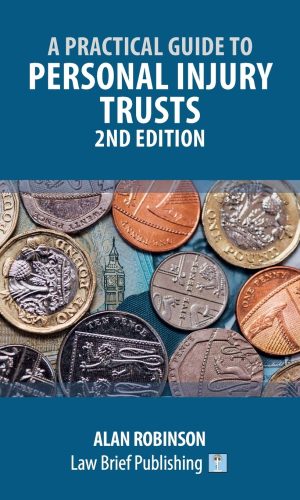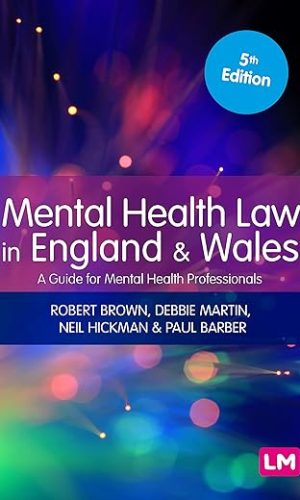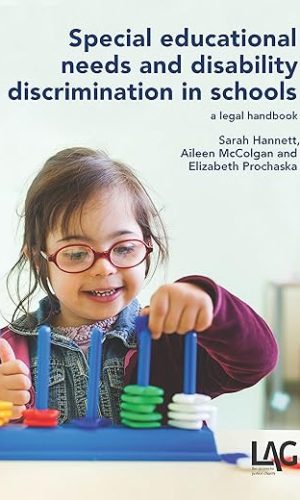Social Issues
-
A Practical Guide to Personal Injury Trusts – 2nd Edition
Means tested social security benefits normally include a capital rule, under which someone with excess capital is disqualified from the benefits, or the amount payable is reduced. Similarly, someone with capital in excess of a certain amount is disqualified for local authority social care services, or will be required to make a contribution from their capital. Because a windfall, such as a legacy, can thereby deprive the claimant, the rules were amended to allow compensation for personal injury to be treated as exempt from the capital rule if placed in a trust. This in turn awakened interest in the personal injury trust as a method of dealing effectively with compensation for personal injury, and also of ensuring tax efficiency. Personal injury trusts, therefore, have become a basic tool for use by personal injury practitioners and by private client advisers.This new edition brings together the law on benefits, taxation and social care. It brings up to date both the changes in benefits (particularly with the national roll-out of universal credit) and the changes in tax as they affect personal injury trusts, and also considers the view of the Court of Protection on PI trusts as a method of administering the property of someone without capacity.
ABOUT THE AUTHOR
Alan Robinson qualified as a solicitor in 1972. He has spent the whole of his working life focussing on areas of practice around welfare law (in particular social security and community care) and around the law as it affects charities. He has written and spoken extensively on these topics. He retired from legal practice in 2010 and now works part-time as a consultant and trainer. He is the author of “Introduction to the Law of Community Care in England and Wales” (Law Brief Publishing).
Read more
£28.50 -
Mental Health Law in England and Wales: A Guide for Mental Health Professionals (Mental Health in Practice Series)
Mental Health Law in England and Wales is a comprehensive guide to the Mental Health Act 1983 for any mental health professional – from social workers, psychologists and occupational therapists, to doctors and nurses. The book aims to simplify mental health law so that it’s accessible to busy professionals at all stages of practice as well as those affected by mental health law.Key chapters include details on who operates the Act, who is affected by it, how the law governs issues of capacity and consent to treatment, how to appeal against compulsion, and the role of the nearest relative. There are also important chapters on advocacy, children and human rights issues, as well as extensive appendices which provide access to the 1983 Act itself, important rules and regulations, and a summary of key cases.
This Fifth Edition includes:
– Practical advice and checklists for working with the Act.
– An updated text of the Mental Health Act and relevant Rules and Regulations.
– Recent case law including the Devon judgment on Mental Health Act assessments.
– A summary of the Human Rights Act 1998.
– Guidance on the interface between the Mental Health Act and the Mental Capacity Act.
– Recent case law concerning the ‘relevant information’ when assessing for incapacity.Read more
£41.60£47.50 -
Special Educational Needs and Disability Discrimination in Schools: A Legal Handbook
Rated 5.00 out of 503This practical guide covers the law and policy of Special Educational Needs (SEN) and disability discrimination in schools with detailed step-by-step guidance on the process for obtaining Education, Health and Care (EHC) plans and SEN appeals. Aimed primarily at the parents of children and young people with SEN, it is an accessible guide to the complex web of education legislation, policy and procedure. It will also be an invaluable resource for legal advisers, local authority SEN officers, teachers and professionals working in the field of education.The Children and Families Act 2014 introduced the biggest changes to the SEN legislative framework in over 30 years. Statements of SEN have been replaced by EHC plans to recognise that a child’s education, health and social needs should be viewed holistically and the framework now includes children and young people up to the age of 25.
The authors have extensive expertise in education law and cases involving special educational needs and disability. They appear regularly for parents, schools and local authorities in the First-tier Tribunal, the Upper Tribunal and the Administrative Court.
Contents include:
– General principles
– EHC assessments and plans
– Content of EHC plans
– Appeals to the First-tier Tribunal, mediation and complaints
– Children and young people with SEN in detention
– Disability discrimination
– Challenging the decision of the First-tier Tribunal
– School transport
– Inter-authority disputes
The main text is supported by appendices including the key provisions of the Children and Families Act 2014 and other relevant legislation and extracts from the SEND Code.
Special educational needs and disability discrimination in schools is essential reading for the carers of children and young people with special educational needs or a disability, lawyers, educators, local authority SEN officers, voluntary sector advisers and health and social care professionals.
Read more
£42.80 -
Housing Conditions: tenants’ rights
Rated 5.00 out of 507Housing Conditions: tenants rights is the definitive legal guide to bad housing conditions in rented accommodation in England. It covers the private rented sector, council housing and homes let by housing associations or other social landlords. Previously titled Repairs: tenants rights, it has long been recognised as the essential text for all housing advisers and lawyers dealing with disrepair and other adverse conditions affecting residents in rented housing accommodation. The Homes (Fitness for Human Habitation) Act 2018, which came into force in March 2019, is the biggest advance in tenants rights relating to housing conditions for a generation. Initially, it will require all new lettings to be of homes fit for habitation and that they be kept fit. It will further come to apply to virtually all residential tenancies whenever granted. This new edition takes a broader approach to housing conditions in the light of the new Act and this is reflected in the new title and also a significant revision and restructuring of the content. The text of the book is now concerned more generally with problems arising from the poor condition of much rented housing. It deals with fitness for human habitation and with health and safety issues going well beyond the traditional concern of lawyers and other advisers with the topic of repair/disrepair (while also dealing with those issues). Housing Conditions: tenants rights outlines what tenants can do to obtain better conditions themselves, but also what local councils, responsible for housing conditions in their areas, can do to help them achieve improved conditions. Contents include: landlords’ obligations enforcing rights private tenants: involving the local council funding proceedings under the Environmental Protection Act 1990 criminal proceedings and rogue landlords infestations, hazards and absence of amenities compensation Practical step-by-step guidance on how to bring a disrepair claim Extensive set of precedents with worked examples used at all stages of the court process, extracts from legislation and helpful guidance on technical information Housing Conditions: tenants rights is about bad housing conditions in rented accommodation in England. It is primarily written for the assistance of the occupiers of that housing and their advisers, but it will also be useful to landlords, providers of accommodation and to those who advise them. Written and structured in an accessible and practical way, it is an indispensable resource for both non-lawyers and busy practitioners.Read more
£55.40£57.00Housing Conditions: tenants’ rights
£55.40£57.00




